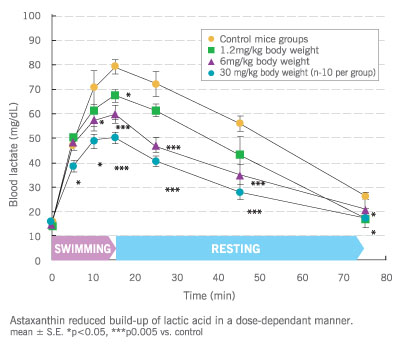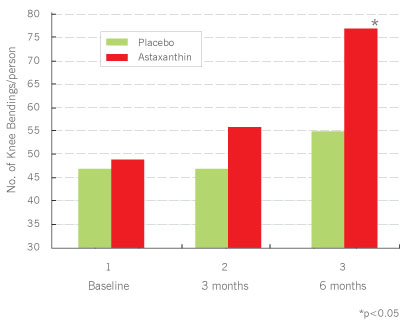|
|
|
|
|
|
|
|
|
Introduction
Last
month, Part 1 explained how the synergy of natural astaxanthin and exercise
may improve a weight management program by boosting fat metabolism (Figure
1). In this concluding issue, we reveal how natural astaxanthin may
improve muscle endurance and reduce muscle damage. Exercise is an essential
part of weight management, however, it is usually a challenge to follow the
program. For example, not only do people tend to encounter physical
barriers such as muscle soreness and endurance, but those barriers could also
be mental stumbling blocks. Combined this with peoples’ high
expectations, weight-loss attempts can quickly lead to failure. In this
situation, natural astaxanthin may help by reducing muscle soreness and
improving endurance.
It is well known
that oxidative stress caused by reactive oxygen species (ROS) increases
during strenuous physical activity and prolonged exposure will damage muscle.
Natural astaxanthin has been shown to protect muscle cell membranes from
oxidative damage during strenuous physical activity1. Figure 2 reveals ROS damaged muscle as dark
areas after strenuous exercise whereas astaxanthin intake reduced oxidative
damage of heart and leg muscle cells. Furthermore, other data showed
significant reduction of DNA damage and lowered inflammatory markers1,2. In reality, we should experience less muscle
soreness and possibly shorter recovery times between exercise sessions. It is
worth noting that the reduction of muscle damage by astaxanthin will not
affect muscular strength development because it is the Super Recovery process
rather than muscle damage that builds muscle strength. Moreover, repeated
muscle damage increases collagen and muscle is filled with protein that
doesn’t contribute to strength.
|
|
References |
|
Fuji Chemical
Industry, |
|
For more
information, please contact us.
If you would prefer not to receive email newsletter, or you’ve changed
your email address, please click here |




